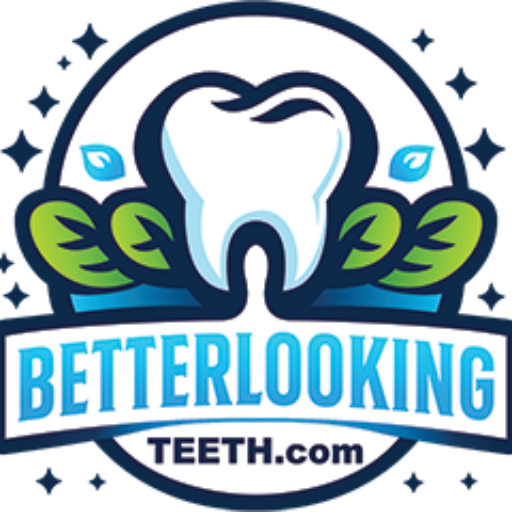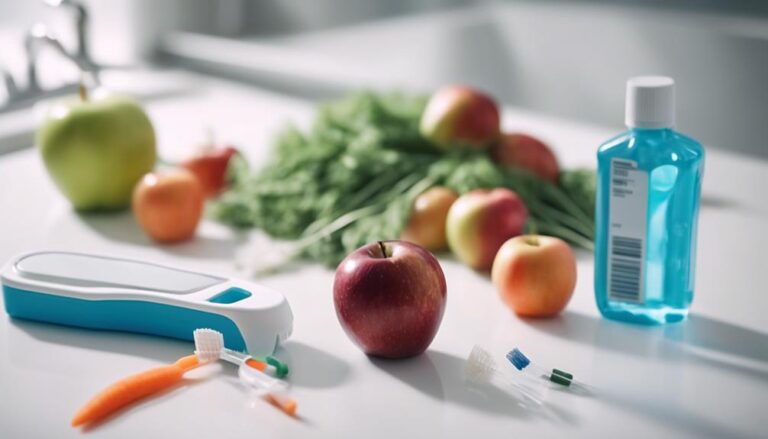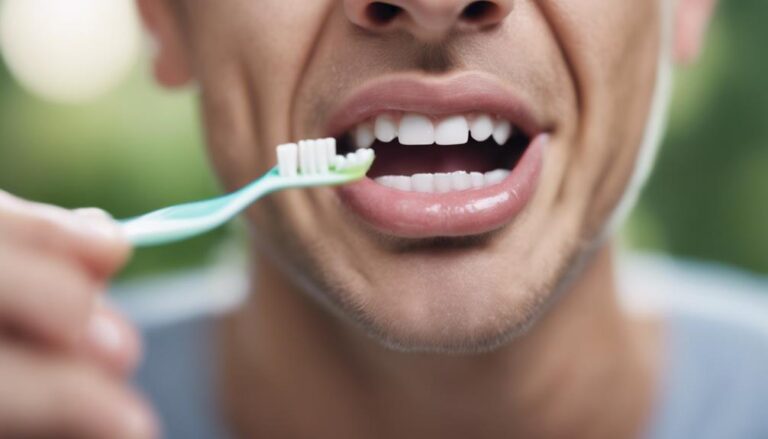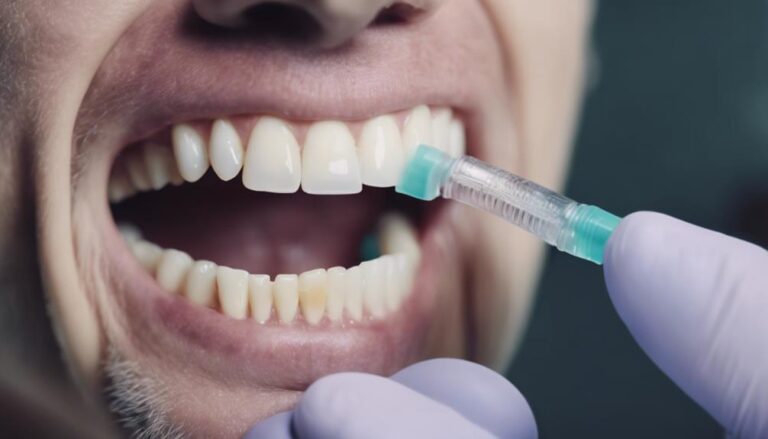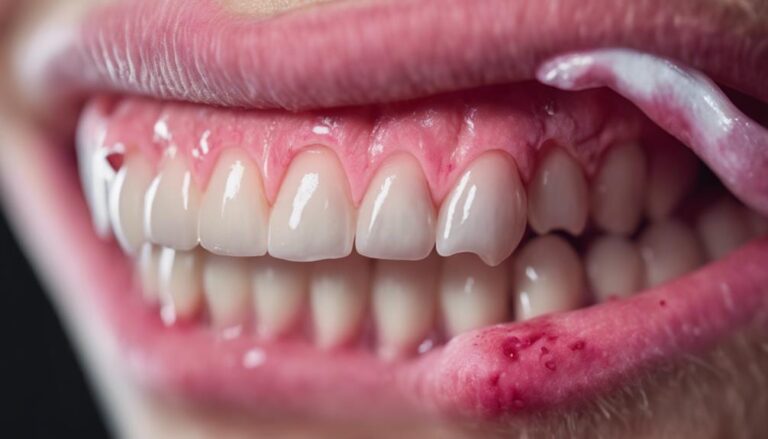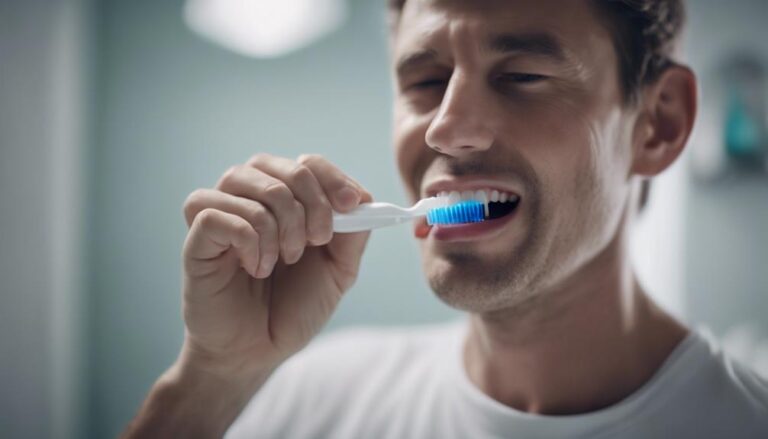When dealing with halitosis and gum disease, I recommend trying natural remedies like tongue scraping and oil pulling. Essential oils such as tea tree and peppermint oil can combat bacteria effectively. Probiotics support gum health and reduce bad breath risk. Proper oral hygiene practices and herbal mouthwashes are beneficial. Dietary changes and professional treatments like deep cleaning are also key. These seven remedies can greatly improve oral health and freshen your breath. Exploration of these options will provide you with valuable insights on managing and preventing halitosis and gum disease effectively.
Key Takeaways
- Tongue scraping removes bacteria and food particles to combat bad breath.
- Essential oils like tea tree and peppermint fight bacteria and plaque buildup.
- Probiotics maintain oral health balance and inhibit harmful bacteria growth.
- Proper brushing techniques and herbal mouthwashes reduce gum disease risk.
- Professional treatments like deep cleaning and laser therapy manage gum disease effectively.
Natural Remedies for Bad Breath
When dealing with bad breath, natural remedies offer a promising alternative to commercial products. Tongue scraping and oil pulling are two effective methods for combating bad breath. Tongue scraping helps remove bacteria and food particles from the tongue’s surface, which are often the cause of unpleasant odors.
Oil pulling involves swishing oil around in the mouth to reduce harmful bacteria. Aloe vera, known for its antibacterial properties, can be used as a mouthwash to help freshen breath. Additionally, baking soda, with its ability to neutralize odors, can be mixed with water to create a mouth rinse that combats bad breath effectively.
These natural remedies not only address the symptoms of bad breath but also tackle the root causes, promoting overall oral health. By incorporating these simple yet powerful remedies into your daily routine, you can effectively combat bad breath in a natural and sustainable way.
Essential Oils for Oral Health
To further enhance oral health, exploring the benefits of incorporating essential oils into your routine can be a valuable step. Essential oils have gained popularity for their potential to promote oral health through their antibacterial properties and aromatherapy benefits. When used in oral care, essential oils like tea tree oil, peppermint oil, and clove oil can help combat bacteria that cause bad breath and contribute to gum disease.
Topical applications of essential oils can be effective in reducing plaque buildup, fighting bacteria in the mouth, and soothing gum inflammation. For instance, adding a drop of tea tree oil to your toothpaste or using a diluted solution as a mouth rinse may help maintain oral hygiene.
Furthermore, the aromatherapy benefits of essential oils can provide an invigorating and soothing experience during oral care routines. Peppermint oil, known for its cooling sensation and pleasant aroma, can leave your mouth feeling clean and fresh after use. Incorporating essential oils into your oral health regimen can be a natural and holistic approach to supporting healthy gums and fresh breath.
Probiotics for Fresh Breath
Incorporating probiotics into your daily routine can play a significant role in promoting fresh breath and overall oral health. Probiotics are beneficial bacteria that can help maintain a healthy balance in the gut, which in turn can have positive effects on oral health. Research suggests that probiotics may contribute to oral health benefits by reducing the levels of harmful bacteria in the mouth that can cause bad breath and contribute to gum disease.
Studies have shown that certain strains of probiotics can help inhibit the growth of bacteria like Streptococcus mutans, which is known to contribute to tooth decay and bad breath. By promoting a healthy balance of bacteria in the mouth, probiotics can help support gum health and reduce the risk of halitosis.
Incorporating probiotic-rich foods like yogurt, kefir, and fermented vegetables into your diet, or taking probiotic supplements, can help support the health of your gut bacteria and potentially improve your oral health. Consider discussing with your healthcare provider or dentist to see if incorporating probiotics is right for you.
Oral Hygiene Practices
Maintaining proper oral hygiene practices is essential for promoting overall oral health and preventing gum disease and bad breath. Two key components of effective oral hygiene are proper brushing techniques and tongue scraping. Brushing techniques involve using a soft-bristled brush with fluoride toothpaste, angling the bristles at 45 degrees towards the gum line, and using gentle circular motions to clean the front, back, and chewing surfaces of the teeth. It is recommended to brush at least twice a day for two minutes each time.
Tongue scraping is another important practice that helps remove bacteria and food debris from the tongue, which can contribute to bad breath. Using a tongue scraper or a toothbrush to gently clean the surface of the tongue from back to front can help improve oral hygiene significantly.
| Oral Hygiene Practices | Description |
|---|---|
| Brushing Techniques | Use soft-bristled brush, fluoride toothpaste, gentle circular motions, and brush at least twice a day. |
| Tongue Scraping | Use a tongue scraper or toothbrush to clean the tongue from back to front to remove bacteria and food debris. |
Herbal Mouthwashes to Try
Exploring the benefits of incorporating herbal mouthwashes can enhance your oral hygiene routine and promote overall mouth health. Herbal infusions are a natural and effective way to combat bad breath and gum disease. Herbal mouthwashes often contain ingredients like peppermint, tea tree oil, and sage, which possess antibacterial properties that can help kill harmful bacteria in the mouth.
Creating your own herbal mouthwash at home is simple and can be tailored to your specific needs. One popular recipe involves steeping fresh mint leaves in hot water, allowing the mixture to cool, and then straining out the leaves before using the infused liquid as a mouthwash. This concoction not only freshens breath but also helps to reduce inflammation and fight bacteria.
Another common herbal mouthwash recipe includes mixing tea tree oil with water and a few drops of peppermint essential oil for an invigorating and antibacterial rinse. These herbal remedies can be a valuable addition to your oral care routine, providing a natural alternative to commercial mouthwashes while promoting excellent dental health.
Dietary Changes for Oral Health
To optimize oral health and combat issues like halitosis and gum disease, considering dietary adjustments can play a significant role in supporting overall mouth health. Consuming sugar-free snacks can help reduce the risk of cavities and gum disease since sugar feeds the bacteria that cause these oral health issues. Opting for snacks like raw vegetables, nuts, or cheese can be beneficial choices for both your oral health and overall well-being.
Hydration habits are also essential for maintaining good oral health. Drinking an adequate amount of water throughout the day helps wash away food particles and bacteria that can lead to bad breath and gum disease. Additionally, staying hydrated promotes saliva production, which is essential for neutralizing acids in the mouth and protecting against tooth decay.
Professional Treatments for Gum Disease
Professional dental treatments for gum disease often involve deep cleaning procedures to remove plaque and tartar buildup from below the gum line. In more severe cases, surgical options may be necessary to address advanced gum disease. One common surgical treatment is flap surgery, where the gums are lifted back to remove tartar and then secured back in place.
Another advanced treatment for gum disease is laser therapy. This minimally invasive procedure uses a dental laser to target and remove infected tissue while promoting the regeneration of healthy gums. Laser therapy can help reduce gum inflammation and improve overall gum health.
When considering professional treatments for gum disease, it’s essential to consult with a periodontist who specializes in diagnosing and treating gum conditions. They can provide personalized recommendations based on the severity of the gum disease and individual oral health needs. By seeking professional care and following recommended treatments, individuals can effectively manage gum disease and prevent further complications.
Frequently Asked Questions
Can Genetics Play a Role in Causing Halitosis and Gum Disease?
Genetic predisposition can indeed play a role in causing halitosis and gum disease. Understanding my family history helps guide treatment options. Prevention measures, like regular dental visits and good oral hygiene, can mitigate these conditions.
Are There Any Specific Foods That Can Worsen Bad Breath?
When considering food choices, some options may impact bad breath. Hydration plays a crucial role in oral health. It’s important to be mindful of what we consume to maintain fresh breath and overall dental wellness.
Can Stress and Anxiety Contribute to Oral Health Issues?
Managing stress and finding ways to relieve anxiety are essential for maintaining good oral health. High stress levels can contribute to issues like gum disease and bad breath. Prioritizing mental well-being can positively impact overall health.
Is There a Link Between Hormonal Changes and Gum Disease?
I’ve learned that hormonal changes can impact gum health. Hormonal imbalance may lead to increased inflammation and potential gum disease. Maintaining good oral hygiene is essential during such times to minimize risks and promote overall oral health.
How Often Should I Replace My Toothbrush to Prevent Bad Breath?
I replace my toothbrush every three months to maintain excellent oral hygiene. Regular toothbrush maintenance is essential in preventing bad breath and gum disease. Consistent oral hygiene habits are key to a healthy mouth.
Conclusion
To sum up, integrating natural remedies such as essential oils, probiotics, and herbal mouthwashes can help combat halitosis and gum disease. Maintaining good oral hygiene practices and making dietary changes can also contribute to fresher breath and healthier gums.
Did you know that over 50% of adults have gum disease, making it a common oral health concern that can be addressed with the right remedies and treatments?
